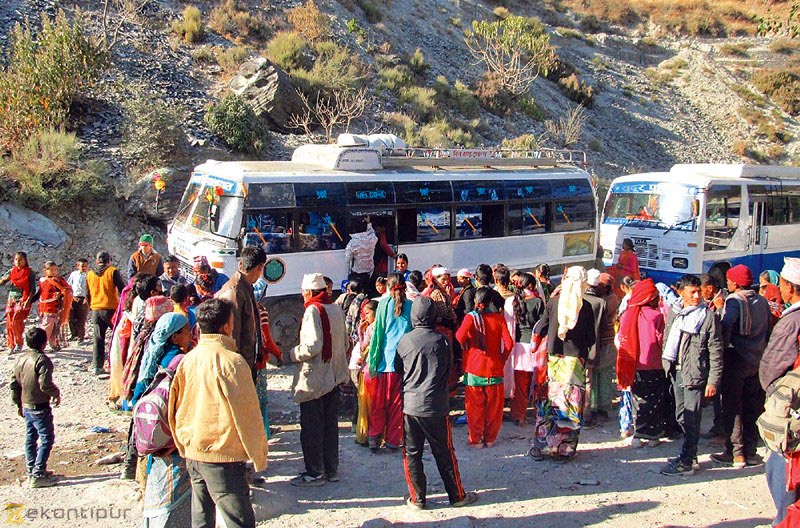Bajhang, March 10, 2017: Prithvi Singh of Kailash village has returned to his former occupation as a seasonal migrant worker after seven years. The 62-year-old is travelling to India again as he has no other source of income.
Singh had been travelling back and forth between Nepal and India since he was 10 years old. As a seasonal worker, he used to spend six months there and six months in his village located in Nepal’s far west close to the Indian border.
He had stopped making the half-yearly trip seven years ago after better-paying opportunities became available in his village.
Singh began collecting medicinal herbs like Satuwa, Lokta, Chariato, Padamchhal and red mushroom from the local forest, and used to earn Rs300,000 to Rs400,000 annually.
The money was enough to provide for his 12-member family. He even constructed a bigger house to accommodate his large family with the income, and he stopped going to India.
However, his happiness did not last long. The high-value herbs were harvested to extinction by collectors who were only interested in profits. They didn’t care much about sustainability, and they left an empty forest behind them. “I had dreamt of a sustainable future, but it turned into a nightmare,” said Singh, who was spotted with his son making preparations to travel to India. “As the forest is now empty, I have to search for alternative livelihoods.”
After demand for high-value herbs started to swell, the seasonal exodus to India stopped dramatically in 2008. The forest plants became an important source of income as they fetched high market prices. People used to earn up to Rs5 million annually by selling herbs like yarsagumba, wild garlic, katuki and Satuwa. During the harvest season, villagers used to swarm over the jungle. They collected herbs for two to four months, and the money they made was enough to sustain them for a year.
“There has been no migration to India from our village for the last eight years,” said Karna Kathyat, a local of Masta. “Now, there are no plants in the forest to collect. As a result, the village is also empty of men.” Most of them have migrated to India with their families.
Herbs had changed the lives of many villagers. “The income generated from the sale of herbs was beyond our imagination,” said Gorakh Bohara, a local of Kanda.
“Herbs changed the face of the entire village. Some started to enroll their children in private schools in Kathmandu, while others constructed houses in the district headquarters and the Tarai with the income,” he said.
After having stripped the forest of all its herbs, the villagers have gone back to their old lives as migrant labourers in India.
In 2015, Bajhang district exported 113 tonnes of herbs of 18 different types. The forest office collected Rs5.5 million in taxes. The largest export was yarsagumba, celebrated as Himalayan viagra; 356 kg of the herb worth Rs520 million was shipped out.
Sher Bahadur Bohara, a local herb trader, said that medicinal herbs valued at Rs4 billion used to be traded annually three years ago. Now the turnover has dropped to Rs900 million.
“The herb business has dried up, and people who made a living collecting them have been thrown out of work.”
Experts said that medicinal plants were facing extinction due to lack of conservation measures and rampant illegal trade.
According to international conservation group Plantlife, some 15,000 of 50,000 medicinal species are under threat of extinction. Shortages have been reported in China, India, Kenya, Nepal, Tanzania and Uganda.
“The health of millions could be at risk because medicinal plants used to make traditional remedies, including drugs to combat cancer and malaria, are being overexploited,” the Plantlife report said.
In 2008, Bajhang used to supply 30 medicinal species. The number has dropped to 12 in 2015, according to the District Forest Office.
“High-value herbs are being overexploited,” said Hem Kumar Pathak, information officer of the forest office. “Some species are under threat of extinction,” he said, adding that commercial over-harvesting had done the most harm.
By Basanta Pratap Singh







